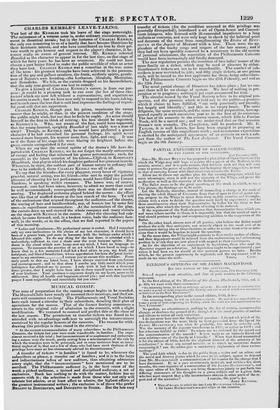PARTIAL EXPERIMENT OF BALLOT-VOTING.
TO THE EDITOR OF TICE srECTATOH.
21st Dumber 1831.1.
Sts.—Mr. HENRY' Bu LIVER has proposed a plan (that of Open Questions) by which the Whigs may still hope to itceive the support of the Radicals in the ensuing session ; and it is quite certain, that without such aid they will WW1 cease to possess the power of neglecting and betraying their supp“rtirs, as well as that of currying favour with their inveterate enemies the Tories.
Allow me to throw out another plan for the ensuing campaign, which has some advantages, since it will test the sincerity of the Whigs, and prove the moderation as well as the sincerity of the Reformers. The Ballot seems to be the great question, or the stock in which, to use a City phrase, the biddings are to be made. Let the Radicals, therefore, instead of dernanding a change in the mode of electing the whole House of Commons from that of open to that of secret vot- ing, propose to the Whigs to select froni forty to fifty counties aud boroughs, chosen with a view to decide the question most fairly by experiment ; and let these constituencies elect their Representative by ballot for the three or four next turns, after which the former mode of voting to he restored. If the arguments of the Radicals possess that demonstrative force which you and some others ascribe to them, it is impossible but that the result of such a trial should produce a large and overpowering addition to the supporters of the Ballot.
On the other hand, sincere men of all parties, who believe the Ballot would produce the evils they anticipate, can scarcely object to the small evil of its continuance during two or three elections, in order to render those evils so noto- rious that it would be hopeless to renew the question. In the mean time, the Whigs:might continue to float on the surface of affairs; and their dependents would be relieved from the embarrassing and unbecoming position in wliich they are now placed with respect to their constituents. As for the objection of an experiment in legislation, those who read the Spectator require no refutation. All legislation ought to he experimental ; and unless it had been so, we should at this moment possess no laws. Besides which, let the present opportunity be neglected, and the experiment will be
made on ten times the scale. Yours, CITES.


























 Previous page
Previous page